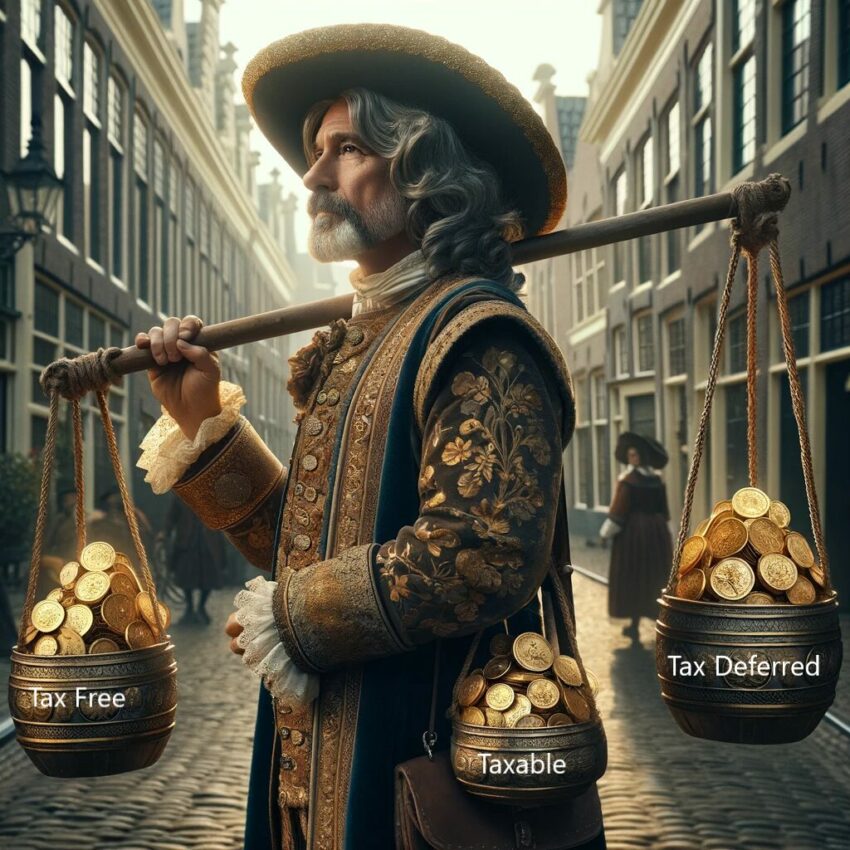I continue to play around with AI and I frequently ask the same question over time to see if AI models evolve. My latest question was to create a 3 ETF income and growth ETF portfolio for 3 types of accounts: taxable, Roth IRA, and traditional IRA. I also asked it to optimize the tax regime.
Here is the response:
Below is a clean, advisor-style recommendation for three separate 3-ETF portfolios—one for each account type—optimized for growth + income while respecting tax efficiency rules.
✅ Guiding Principles Used
Before giving allocations, here’s the logic behind the design:
Taxable Brokerage Account
- Avoid high-turnover or high-yield bond funds (ordinary income → taxed worst).
- Prefer tax-efficient equities, municipal bonds, and qualified dividend ETFs.
- Keep REITs and bonds out of taxable—those produce non-qualified income.
Roth IRA
- Roth = tax-free forever, so put the highest-growth, least tax-efficient assets here.
- Great for REITs and high-yield equity.
- Growth compounds tax free → long-term wealth maximization.
Traditional IRA
- Withdrawals taxed as ordinary income later.
- Good for income-heavy assets you wouldn’t want in taxable.
- Also a good place for core bonds because interest is shielded.
📦 1. Taxable Brokerage Account — “Tax-Efficient Growth & Income” (3 ETFs)
Goals: minimize taxes, maximize qualified dividends, maintain moderate income.
ETF Weight Reason
- VTI – Total U.S. Stock Market ETF 60% Extremely tax-efficient, low turnover, high share of qualified dividends.
- VXUS – Total International Stock ETF 20% International exposure, most dividends qualified; tax-efficient broad index.
- MUB – iShares National Muni Bond ETF 20% Tax-free municipal income → ideal for taxable accounts.
- Expected Characteristics
- High tax efficiency
- Income primarily qualified + tax-free muni interest
- Broad diversification
📦 2. Roth IRA — “High-Growth + High-Income (Tax-Free)” (3 ETFs)
Goals: maximize long-term tax-free growth; include high-yield assets that are otherwise tax-inefficient.
ETF Weight Reason
- QQQ or VUG – Nasdaq 100 / Large-Cap Growth 40% High-growth allocation thrives in Roth.
- SCHD – Schwab Dividend Equity ETF 30% Strong dividend growth, high quality; tax-inefficient dividends become tax-free in Roth.
- VNQ – Vanguard Real Estate ETF 30% REIT dividends are 100% non-qualified → PERFECT for Roth.
- Expected Characteristics
- Strong long-term compounding potential
- High distributions without tax drag
- Balanced mix of growth + income
📦 3. Traditional IRA — “Income-Focused & Tax-Sheltered” (3 ETFs)
Goals: hold the least tax-efficient income assets here since withdrawals taxed anyway.
ETF Weight Reason
- VTV – Vanguard Value ETF 40% Higher dividends and lower tax efficiency, good match for Traditional IRA.
- BND – Vanguard Total Bond Market ETF 40% Interest is taxed as ordinary income → best housed in Traditional IRA.
- DVY – iShares Select Dividend ETF 20% High-yield equities with non-qualified dividends—good to shelter here.
- Expected Characteristics
- Strong income generation
- Lower tax efficiency assets protected
- Balanced with core bonds for stability
📊 Summary — Optimal Structure by Account Type
Account Focus Portfolio Theme
Taxable Brokerage Tax-efficient income VTI / VXUS / MUB
Roth IRA Highest growth & tax-inefficient income QQQ/VUG / SCHD / VNQ
Traditional IRA Income + tax-inefficient dividends and bonds
In October 2023, I wrote this post about some of the ETFs in my portfolio and since that time I’ve changed some of the ETFs I’ve owned moving mostly to cash given the market’s over valuation and deteriorating economic conditions.
The ETFs AI recommended aren’t the ones I would necessarily buy during a major market correction but it does give some ideas. I continue to own SCHD and that will be a core holding till I die. Instead of MUB, I have NEA and MLN but I’ve stop accumulating and just hoarding the cash these ETFs generate.
I do like that AI correctly assessed the types of ETFs that should go into each kind of bucket to optimize taxes. I will continue to play with AI and prompt engineering to see how it evolves over time but it is evolving nicely.
Share The Wealth
Are you using AI as a sounding board or junior financial advisor yet? Let me know in the comments below.

